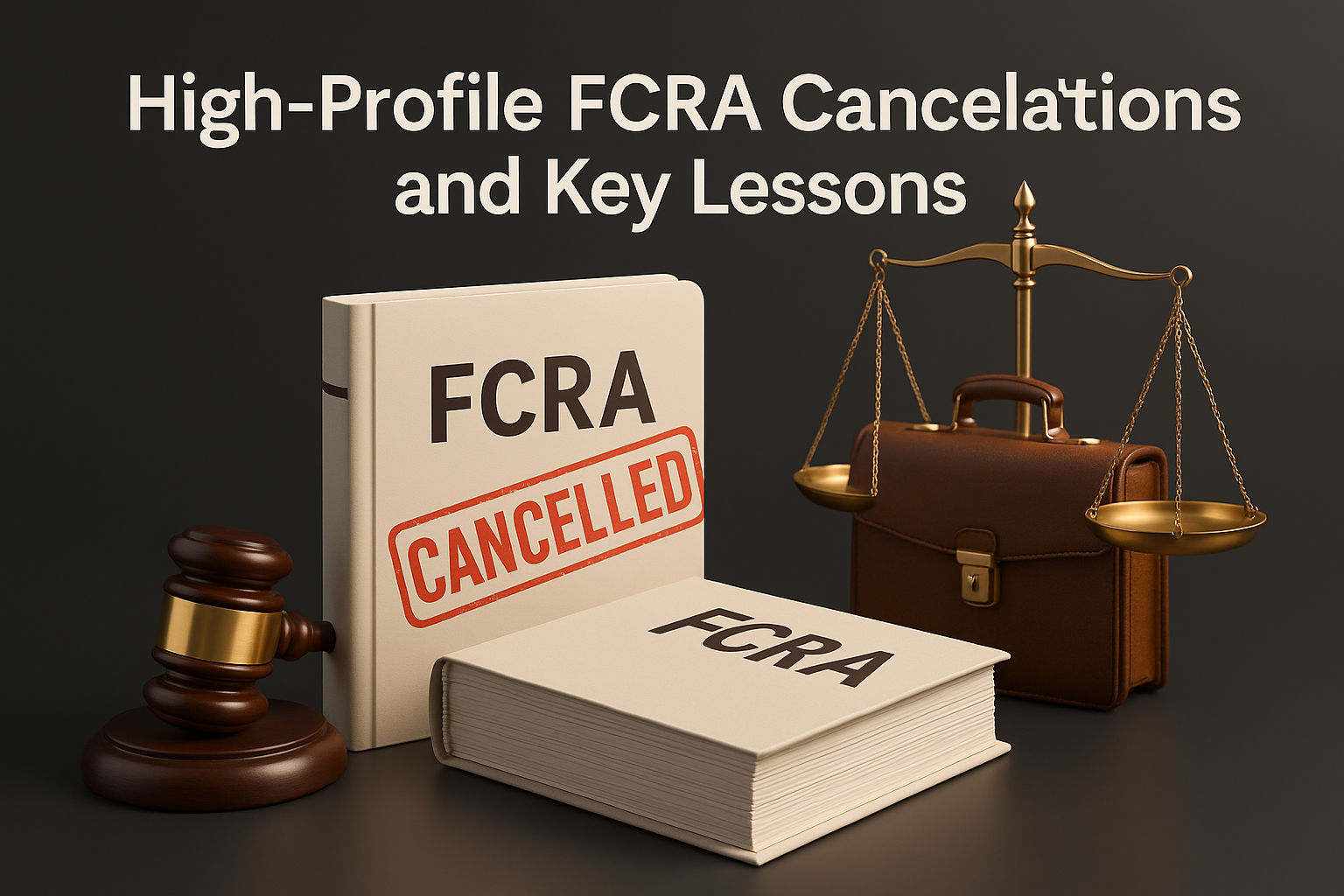
High-Profile FCRA Cancellations and Key Lessons
Overview
The MHAs cancellation of over 20,000 FCRA registrations since 2011, including high profile cases, underscores the governments stringent oversight of foreign contributions. These cancellations, often involving prominent NGOs, highlight the consequences of non compliance and offer critical lessons for others. Violations such as misuse of funds, unauthorized transfers, or activities deemed against national interest have led to severe penalties, including operational shutdowns. Understanding these cases and their lessons is essential for NGOs to navigate FCRAs complexities and sustain their missions.
Statutory Framework
Section 14 of the FCRA, 2010, empowers the MHA to cancel registrations for violations, including using funds for purposes other than those registered, engaging in activities detrimental to national interest, or failing to maintain proper accounts. Penalties under Sections 3335 include fines, fund seizure, and imprisonment. The 2020 amendments tightened scrutiny, prohibiting fund transfers to other entities and mandating the SBI Designated Account, increasing the risk of cancellation for non compliance.
Notable Cases and Lessons
**Centre for Policy Research (CPR)**:- **Details**: CPRs FCRA registration was canceled in February 2024 for allegedly using foreign funds for undesirable purposes and engaging in litigation and activism through environmental projects. CPR refuted these claims, but Income Tax surveys in 2022 and a 115-page notice in 2023 led to cancellation, severely impacting its operations.- **Lesson**: NGOs must ensure activities strictly align with registered objectives. Perceived deviations, even if unintentional, can trigger cancellation.- **World Vision India**:- **Details**: World Vision Indias registration was canceled for transferring funds to other NGOs, a prohibited activity under FCRA, and alleged misuse of funds.- **Lesson**: Strict adherence to the prohibition on fund transfers is critical. NGOs must maintain financial segregation and avoid unauthorized disbursements.- **Oxfam India**:- **Details**: Oxfam Indias FCRA license was canceled in January 2022 for violations, including fund transfers and activities deemed against national interest.- **Lesson**: NGOs must avoid activities that could be interpreted as political or against national interest, ensuring compliance with FCRAs purpose restrictions.- **Amnesty International India**:- **Details**: Amnestys operations shut down in 2020 after its FCRA registration was not renewed, citing advocacy and activism as violations.- **Lesson**: Advocacy activities, even if aligned with charitable goals, must be carefully managed to avoid being perceived as political.- **Lawyers Collective**:- **Details**: The Lawyers Collective, led by Indira Jaising and Anand Grover, had its registration canceled in 2017 for misusing funds for litigation and advocacy.- **Lesson**: Legal advocacy must align with registered objectives and avoid sensitive areas to prevent scrutiny.
Judicial and Regulatory Insights
The MHAs cancellation of over 20,664 registrations since 2011, with spikes in 2015 (over 10,000 cancellations), reflects rigorous enforcement. The 2022 Supreme Court ruling in *Noel Harper vs. Union of India* upheld FCRA amendments, affirming the governments authority to cancel registrations for national interest violations. Cases like the 2017 suspension of the Public Health Foundation of India for alleged lobbying highlight the MHAs focus on fund utilization and transparency.
Practical Scenarios
An NGO like CPR faces cancellation for alleged misuse, reducing its staff from 150 to 20 and freezing funds, but challenges the decision in court. World Vision Indias cancellation for fund transfers halts its programs, emphasizing the need for compliance. An NGO avoiding cancellation by maintaining transparent records and aligning activities with its objectives continues operations smoothly. Another NGO facing scrutiny for advocacy rectifies its compliance and avoids cancellation through compounding.
Common Pitfalls and Mitigation
Strategies A common error is engaging in activities outside registered objectives, risking cancellation. NGOs should align all activities with their FCRA registration. Unauthorized fund transfers, as seen in World Visions case, are another pitfall; strict adherence to transfer restrictions prevents this. Inadequate record keeping invites scrutiny; maintaining detailed, audited records mitigates this. Lastly, failing to challenge cancellations legally can limit recourse; engaging legal experts to appeal decisions is advisable.
Professional Recommendations
NGOs should align all activities with their registered objectives, avoiding political or sensitive areas. Maintaining transparent, audited records of fund utilization and adhering to banking protocols is critical. Engaging legal experts to challenge cancellations or apply for compounding strengthens outcomes. Regular training on FCRA compliance and staying updated on MHA guidelines ensure proactive governance. NGOs should also explore legal recourse, as seen in CPRs court challenge, to protect their registration.
Conclusion
High-profile FCRA cancellations highlight the severe consequences of non compliance, including operational disruptions and reputational damage. NGOs must prioritize transparency, align activities with objectives, and maintain robust records to avoid cancellation. Learning from cases like CPR and Oxfam India, NGOs can strengthen compliance and sustain their charitable missions.
Government Grants: An Exhaustive Analysis Under Income Tax Law and Ind AS Framework Government...
Private trusts serve as powerful tools for asset management and wealth preservation, but understan...
FCRA Renewal Process: Timeline, Documents, and Grounds for Rejection Overview The FCR...
How to File Annual Returns Under FCRA (Form FC-4) 3.1 Legal Framework Section 19 of t...
Are Facebook or PayPal Donations Considered Foreign Contributions? Overview The adven...
Step-by-Step Guide to Registering a Charitable Trust in India A charitable trust is a legal arra...
Anonymous Donations and Tax Liability Under Section 115BBC– What NGOs Must Know S...
Understanding Charitable Trusts in India In India, the most commonly understood form of constitut...
Donations from Non-Resident Indians (NRIs) and Overseas Citizens of India (OCIs) Overvi...
Treatment of NGO Consultancy Income Overview NGOs often augment their resources by of...